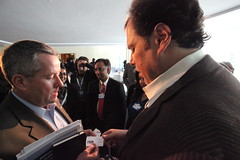
Part of developing my new startup has required me to do a lot more networking than I’ve ever had to do in the past. This has meant attending networking events both in my local city and in nearby cities. I’ve noticed that in the process of attending such events, my approach towards them has also changed.
In the past, I would only attend events where I had a clear purpose and reason to attend. If I didn’t know the people well, or it seemed outside my area of interest or expertise, I would skip it. Why waste my time otherwise, right?
However over the past few weeks, after attending several networking events, I’ve noticed that my expectations going in and what I came out with were often very different. This has opened my mind to such situations and I’m now more liberal in the choices of events that I’ll attend. In fact, I’m now even begun attending (and speaking at) functions outside my regular base, as doing so provides the following benefits:
Practice your Pitch
Each time I attend an event where I’m introduced to new people, this gives me the opportunity to pitch my product again. I’ve talked about the benefits of this before but it’s worth repeating. The more you practice pitching your product, the better you will get at it. In the process, people will ask you questions about your products that you will need to know the answer to.
When I began, I found my initial pitch to be several minutes long, glossing over details that I later found to be unimportant. The questions that people asked, helped me refine the pitch to focus on the important details of the business. Being able to make a short, to the point pitch gives you two benefits:
- If the person you are talking to isn’t really interested in your product, it saves you and them time.
- If the person you are talking to is interested in your product, then you will be providing him with just enough information to know that he is interested, so that he will want to continue talking to you. The last thing you want to do is bore a potentially interested party with uninteresting details. They get pitches like this all the time, so it’s important to pique their curiosity early!
Market Research
If it turns out that the people you are talking to can’t help you directly as a potential investor, adviser or team member, they may still be able to provide you with valuable market research. Perhaps they fit the profile of the type of person who would use your product or service. Take this opportunity to find out what they think of your product from that point of view. Do they use competing products? What do they like or dislike about those products? Does your product or service solve any problems they are currently having.
These past few weeks, I’ve walked into several events, looking to make contacts with potential investors, advisers or team members. While I wasn’t able to find those, I was able to come away with valuable market research advice, that made attending the event very worthwhile.

Make Connections
One of your first investments as a company, should be in a set of business cards. Also get yourself a business card holder to put all these cards in. Replace the cards you give out, with cards you receive in return.
Create a system of making connections. If you’re receiving cards, separate relevant ones that you want to follow up with separately. Write notes on the cards if there are important details you want to remember.
If you have specific needs, ASK. Tell the people “Hey I’m looking for someone who can help me with…” Just because they may not be able to help you directly, doesn’t mean they don’t know someone who can!
This also extends to people you haven’t met in person. If there’s someone in the community you would like to meet, touch base with them on Twitter first. I did so with the CEO of a huge company in the similar market. That tweet led to a direct phone call, and now a regular email relationship. Who would have thought?!
Get Advice
There is a misconception that people have about asking for advice. It doesn’t cost anything, so ask for it! In the beginning, I shied away from the bigwigs at such events – big investors or other famous people in attendance. Why would they want to talk to little ole me?
What surprised me was that not only were they willing to talk to me, they were also willing to provide free advice! Take advantage of it. Establish connections with them on Twitter and other social networks and get the ball rolling. If they don’t want to talk to you, let them make that decision, but more often than not they will!
Make Friends
Have balance in your life. Not all meetings have to be about business and how to increase profits. It is also perfectly okay to just have a good time. Share funny stories. Become friends and nothing else. Enjoy the journey and take a break whenever you need it. You’ll get more out of life that way.

